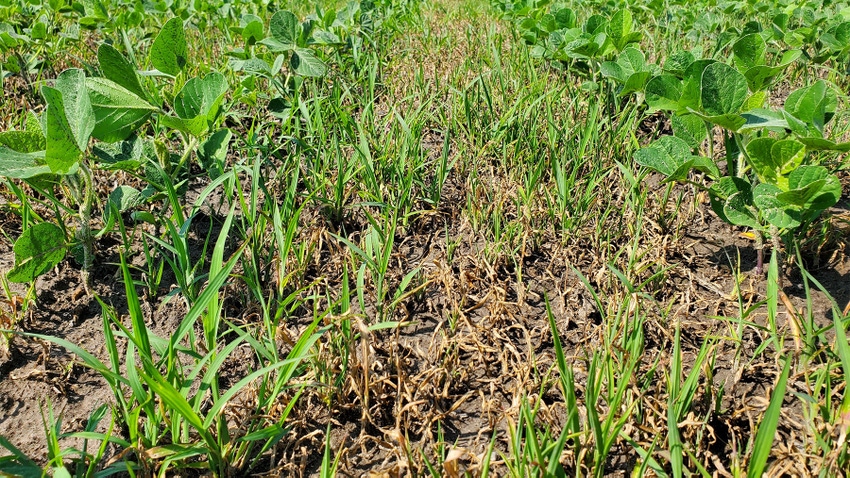
At a Glance
- Everman said new concerns are arising with grasses becoming resistant to glyphosate in North Carolina.
- Five-way resistant waterhemp and four/five-way resistant southern ryegrass will require rotation and alternate treatment.
Every football coach knows that if you run the same play repeatedly, your opponent will figure it out and find a way to beat you. Wes Everman says the same is true for resistance management and effective weed control.
“We have to try to keep Mother Nature guessing. Don’t give her a leg up. We give these weeds a chance to beat us by doing the same thing over and over. In sports, if you do the same thing over and over, whoever you’re trying to beat is going to figure out and beat you. If you run the same offense, and run the same play in football or basketball, the defense is going to figure it out and beat you with it. Mother Nature is the same way,” says Everman, North Carolina State University Extension weed specialist.
At a soybean and corn weed management meeting March 5 at the Bertie County Extension Center in Windsor, Everman emphasized the tried-and-true strategy of using multiple modes of action, using residual herbicides, killing weeds when they are small, and using the full rates of herbicides.
He also highlighted the value of other tools such as cover crops, and in the future, the possibility of turning to harvest weed seed control to battle weeds.
New resistance concerns
Farmers are aware of herbicide-resistant Palmer amaranth, but Everman said new concerns are arising with grasses becoming resistant to glyphosate in North Carolina. Glyphosate-resistant junglerice, goosegrass, waterhemp, and Italian ryegrass have all been identified in the state.
“We haven’t had a lot of issues with grasses in the past, but they’re starting to become a bigger issue. This is something we need to be thinking about and be aware of,” Everman said.
“We rely a lot on glyphosate for grass control. We’re starting to see more resistance in our grasses. We need to do something there. We want to identify our tank mix combinations that are cost effective. Keep using those. Get good to excellent control, and don’t sacrifice control for savings,” he said.
Everman said five-way resistant waterhemp to atrazine, ALS inhibitors, PPO inhibitors, glyphosate and HPPD inhibitors has been confirmed in North Carolina. Palmer amaranth resistance to glyphosate, glufosinate, HPPD inhibitors, PPO inhibitors, and atrazine has also been confirmed, but none are resistant to more than 3 modes of action.
Four or five-way resistant southern ryegrass has been confirmed in North Carolina’s southern Piedmont to glyphosate, ALS inhibitors, PPO inhibitors, HPPD inhibitors, and paraquat. Everman said the paraquat resistance is new and has only been confirmed in ryegrass in one or two other states, besides North Carolina.
“What’s most concerning to me is we seeing this stacked resistance. We are seeing resistance to three, four, up to five modes of action. If we have resistance to one, two, even three, we still typically have other herbicide options. As we start getting into four or five, we’re losing our ability to control this in our current system. We’ve got to start finding new ways to manage it,” Everman said.
Dicamba still strong option
Everman said the good news is that dicamba is still very effective in controlling Palmer amaranth in North Carolina. Also, PPO inhibitors are still effective in most areas of the state, but he said farmers are heading toward losing it to resistance. “We need protect it where we can and make sure we’re using other modes of action to stay on top of it.”
In essence, Everman said the challenge of weed management boils down to the genetic variability of the various weed species. Some biotypes within a species are completely controlled by herbicides, while other biotypes are not.
“That variability in the populations is going to show through if we just keep using one mode of action. This is why we see resistance. There is a big range in that genetic diversity and how they are going to respond,” Everman said.
Everman is also worried because metabolic resistance to herbicides is now starting to show up. In metabolic resistance, weeds identify an outside force, such as the chemistry in an herbicide, recognize it as being a threat, and then break it down or sequester it so the herbicide can’t do its job and hurt the weed.
“The weed sees that invader as bad, and it breaks it down. It metabolizes it. It breaks it down to a form that doesn’t hurt it. We are seeing this in different species where they are testing this. It might be what we’re seeing in North Carolina. But more importantly that’s what’s on the horizon,” Everman said.
In the meantime, Everman said farmers need to turn to different cultural practices, such as cover crops to control weeds. Also, N.C. State is now examining harvest seed weed control as a possible weed management option, but the technology is still not ready to be widely adopted in North Carolina. Everman said herbicides will remain a weed control option in the foreseeable future, but additional control measures must be adopted.
He cautions that farmers are facing a future weed management cliff and need to make strategy changes to ensure they don’t fall off. “We’re not there yet. We have time. We can make changes. We’ve got to start thinking about integrating our weed management practices now while we still have herbicides as an option.”
He encourages farmers to consider different options such as cover crops, and to integrate practices bit by bit.
“Try some new thing while you still have good and excellent control with our herbicides. Managing a cover crop isn’t intuitive and easy the first time you do it. Figure these things out. Implement them where they make sense. Figure out what works best for you,” Everman said.
About the Author(s)
You May Also Like






